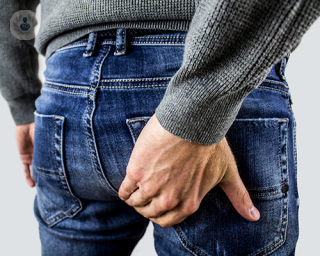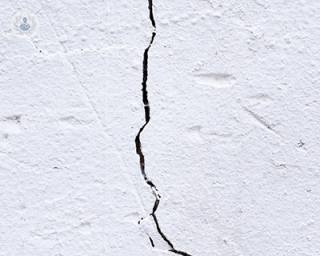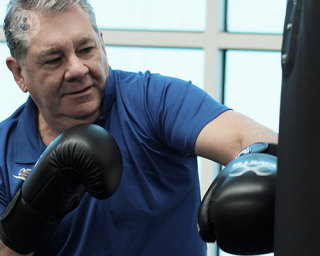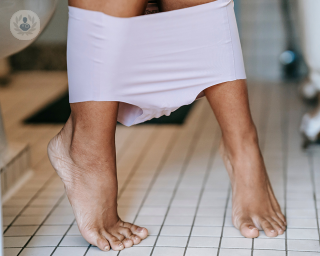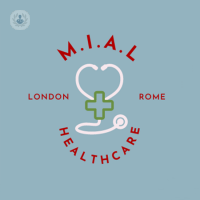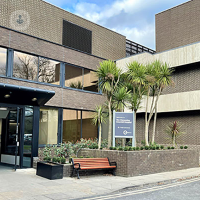Anal fissure
Mr Paul Skinner - Colorectal surgery
Created on: 11-13-2012
Updated on: 07-19-2023
Edited by: Aoife Maguire
What is an anal fissure?
An anal fissure (fissures) is a tear or crack in the lining of the anal canal (anus), which causes extreme pain during bowel movements. It is the most common cause of rectal bleeding in infancy. A fissure tends to occur when passing hard or large stools during a bowel movement. There may also be spasms in the ring of muscle at the end of the anus.
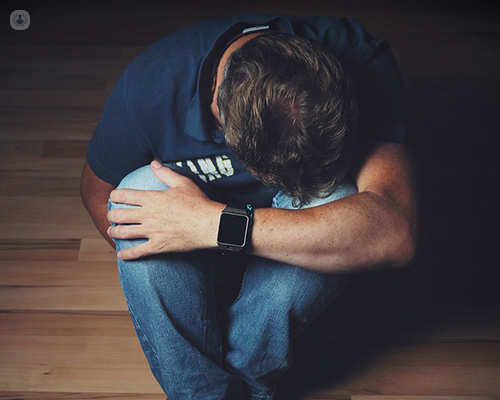
What are the main causes of an anal fissure?
Common causes of an anal fissure include passing large stools, constipation and straining during bowel movements, chronic diarrhoea, inflammation of the anorectal area, and childbirth. The less common causes of anal fissures include anal cancer, HIV, tuberculosis, syphilis, and herpes.
What are the associated symptoms?
There are many warning signs that a patient might have an anal fissure. The most common symptoms and warning signs of an anal fissure include the following:
- severe pain during bowel movements
- pain after bowel movements
- blood on the stool or toilet paper
- itching or irritation around the anus
- a visible crack in the skin around the anus
- a small lump on the skin near the anal fissure
How is an anal fissure treated non-surgically?
An anal fissure will often heal within a few weeks if the stool is kept soft through increasing the intake of fibre and fluids. Soaking in a warm bath for 10 to 20 minutes daily, especially after toilet use, helps to relax the sphincter and helps it to heal. A doctor may recommend topical anaesthetic creams for pain relief. A Botox (Botulinum toxic type A) injection can paralyse the anal sphincter muscle and aids in relaxing spasms. Blood pressure medications can also help relax the sphincter.
Can anal fissures be prevented? If so, how?
Preventing constipation may help when it comes to preventing an anal fissure. Constipation can be prevented when eating high-fibre foods, drinking water, and regularly exercising.
Who is most at risk of experiencing an anal fissure?
Experts are unsure as to why, but many infants experience an anal fissure during the first year of their life. We are all at risk of experiencing an anal fissure as we age, due to the fact that circulation and blood flow to the rectal area decrease with age.
Individuals who strain when trying to pass hard stool can increase their risk of tearing, and thus are at a higher risk of experiencing an anal fissure. Anal fissures also become common in women after they give birth, and are so too quite common in patients who have been diagnosed with Crohn's disease, as this inflammatory bowel disease causes chronic inflammation of the intestinal tract, which makes the lining of the rectum vulnerable to tearing. Having anal intercourse also increases one's chances of getting diagnosed with an anal fissure.
Anal fissures can affect everyone, from men and women to young and old people. It is said, however, that young children and young adults between the ages of 15 and 40 years of age are at a slightly higher risk of suffering from anal fissures.
How are anal fissures diagnosed?
Firstly, the patient's GP will ask them a series of questions regarding the symptoms being experienced, and the patient's toilet habits. The GP will then examine the fissure by gently parting the patient's buttocks. Typically, if the GP suspects a cause that is a serious underlying condition, they will refer the patient to a a specialist, who will likely perform a digital rectal examination.
Additional diagnostic tests such as a colonoscopy, a sigmoidoscopy, and an anal manometry, may also be performed if the specialist deems necessary, in order to rule out or diagnose any underlying bowel disorders.
Which specialist treats anal fissures?
Gastroenterologists, general surgeons, and colorectal surgeons are all experts when diagnosing and offering treatment for anal fissures.
When is surgery required?
Surgical intervention for an anal fissure will be required when the patient's anal fissure simply takes too long to adequately heal.

What are the different surgical options available for anal fissures?
There are a handful of surgical options for anal fissures, with the most common ones being as follows:
- lateral internal sphincterotomy
- anal dilation
- dermal flap coverage
- tailored anal sphincterotomy
- fissurectomy
- anal advancement flap
What can I do at home to prevent anal fissures or to ease symptoms?
If you experience discomfort when passing stools, you may have an anal fissure. There are, however, a whole host of things that you can incorporate into your daily life to help avoid or ease the unpleasant symptoms caused by an anal fissure. Some of the most effective home remedies include the following:
- ensure to exercise for at least 30 minutes every day
- ensure to drink plenty of fluids
- gently cleanse the anus area
- incorporate fibre supplements into your diet
- incorporate foods such as nuts, fruit, beans, grains, and vegetables into your diet
When should I seek medical attention?
Patients are encouraged to visit their GP or a specialist if they are experiencing any of the following:
- bowel incontinence
- pain in the anus
- anal warts
Is there anything I shouldn't do if I have an anal fissure?
If you have an anal fissure, it is highy advisable to not ignore the urge to pass a stool. This can make it a lot more difficult to pass the stool.
Where in the anus do anal fissures occur?
It is estimated that between 85 and 90 per cent of anal fissures occur in the posterior midline of the anus, and around 10 to 15 per cent are found in the anterior midline of the anus.

